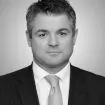- within Compliance topic(s)
- with Senior Company Executives, HR and Finance and Tax Executives
- in European Union
- with readers working within the Accounting & Consultancy, Consumer Industries and Technology industries
James Doe, our Global Co-Head of Construction Disputes, recently spoke at the Energy & Infrastructure Construction Law Roundtable co-hosted with Aluko & Oyebode in Lagos, Nigeria. The event was held in a hybrid format, with over 100 virtual participants and 18 key stakeholders, industry leaders and legal and regulatory experts attending in person.
The event featured two roundtables, with the first discussing the 'future of the African energy market: trends and implications for the construction and industry sector' with a focus on the constitutional amendment in Nigeria and its impact on the transportation and power sectors, energy transition projects and the procurement and delivery of infrastructure projects. This roundtable was moderated by Oghogho Makinde, partner at Aluko & Oyebode.
One of the key points discussed was how the renewable energy needs of African countries differ from those of more developed energy markets, with Nigeria being an example where the more immediate focus is on transitioning to gas and utilising existing infrastructure such as hydropower to solve the energy access deficit. Funding was also highlighted as an area for which a solution needs to be found from within Africa.
The second roundtable considered 'hot topics in the resolution of international construction disputes', including a discussion on choice of contract, termination and methods of assessing delays, with James Doe moderating.
A key takeaway from the session was the importance of choosing the right contract at the outset and how many issues encountered on construction projects can be traced back to the procurement process. Another issue explored during the roundtable was how to deal with contractors facing difficulties in completing a project, including a comparison of soft approaches (e.g. amicable settlement of the contractor's claims) vis-a-vis hard approaches (e.g. putting measures in place to regulate the contractor's claims).
The content of this article is intended to provide a general guide to the subject matter. Specialist advice should be sought about your specific circumstances.




